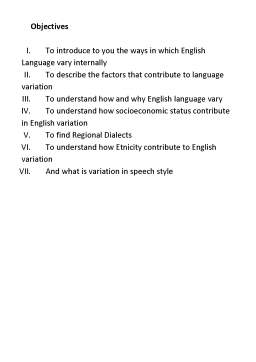Cuprins
- 1. Introduction
- 2. Objectives
- 3. Chapter 1.Language Variation
- 4. Chapter 2.Language and Socioeconomic Status
- 5. Chapter 3.Language and Region
- 6. Chapter 4.Language and Etncity : The case of African-American English
- 7. Chapter 5.Variations in Speech style
- 8. Conclusion
- 9. References
Extras din referat
Objectives
I. To introduce to you the ways in which English Language vary internally
II. To describe the factors that contribute to language variation
III. To understand how and why English language vary
IV. To understand how socioeconomic status contribute in English variation
V. To find Regional Dialects
VI. To understand how Etnicity contribute to English variation
VII. And what is variation in speech style
Introduction
Most people are aware of the fact that systematic differences exist among languages-for example, that English is different from Spanish, which is different Arabic, which is different from Russian, and so on. However, many people are probably not aware of the existent to which systematic differences exist within languages. Internal variation refers to the property of languages of having different ways of expressing the same meaning. This is property that is inherent to all human languages and to all speakers of a language. Thus, no two speakers of a language speak exactly the same way, nor does any individual speaker speak the same way all the time.
Chapter 1
Language variation
1.1 Varieties, Dialects, and Idiolects
The term language variation is used among linguists as a cover term to refer to many different types of language variation. The term may be used in reference to a distinct language such as French or Italian, or in reference to a particular form of a language spoke by a specific group of people such as Appalachian English, or even it references to the speech of a single person . In addition to this cover term, there are more specific terms that are used to talk about these different types of languages varieties.
When a group of speakers of a particular language differs noticeably in its speech from another group we say that they are speaking different dialects. In English, the term dialect often carries negative connotation associated with nonstandard varieties. However, a dialect is any variety of a language spoken by a group of people that is characterized by systematic differences of other varieties of a same language in terms of structural or lexical features. In this sense, every person speaks a dialect of his or her native language. The term dialect is also misused by lay people to refer strictly to differences in pronunciation or sometimes to refer to slang usage. Such mistake is easy to understand since differences in pronunciation are usually accompanied by variation in other areas of the grammar as well and thus correspond to dialectal differences. However, the appropriate term for systematical phonological variation In accent. In layperson’s terminology, accent is often used in reference to “foreign accents” or regionally defined accents such as southern and northern accents. However, here again must be noted that every person speaks set an accent. At the same time, slang has to do more with stylistic choices in vocabulary rather than systematic lexical differences between dialects. Also, as mentioned above, there is variation from speaker to speaker within any given language. The form of a language spoken by one person is known as an ideolect.
While these terms may seem simple and convenient here, when we consider actual languages, it becomes immediately obvious how difficult it is to make certain distinctions. How do we know, for example, if two or more language varieties are different dialects of the same language or in fact they are separate, distinct languages? One criterion used to distinguish dialects from languages is mutual intelligibility. If speakers of one language variety can understand speakers of another language variety and vice versa, we say that these varieties are mutually intelligible. Suppose you are a native of Brooklyn, New York, and go to visit some friends in Beaumont, Texas. You may notice some differences in the speech of your Beaumont friends, but essentially you will be able to understand each other. Your variety of speech and theirs are mutually intelligible, but differ systematically, and are therefore dialects of the same language.
Preview document
Conținut arhivă zip
- Varieties of English.doc




































